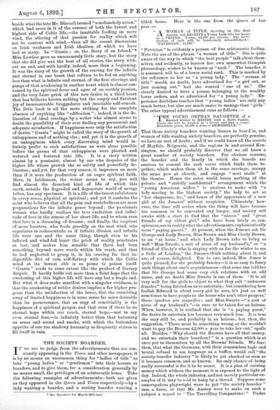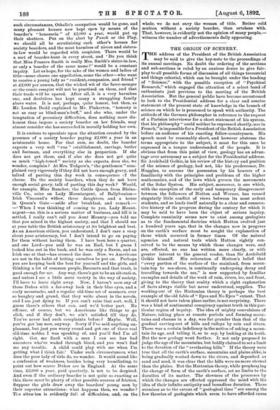THE SOCIETY BOARDER.
TF we are to judge from the advertisements that are con- stantly appearing in the Times and other newspapers, it is by no means an uncommon thing for "ladies of title" to take "young ladies" or "gentlemen" into their houses as boarders, and to give them, for a consideration generally by no means small, the privileges of an aristocratic home. Take the following examples of advertisements—both are given as they appeared in the Queen and Times respectively—by a lady .wanting a boarder, and a society boarder wanting a • See Spectator for March 26th last.
titled home. Here is the one from the Queen of last year :—
" A.WOMAN of TITLE, moving in the first Society, will RECEIVE a Young Lady into her house SS a FRIEND. Terms, £2,000 per R111311111. Any intro- duction of such will be handsomely acknowledged.—
' PATRICIAN,' 13,720."
" Patrician " is evidently a person of fine aristocratic feeling. Note the use of the phrase "a woman of title." She is quite aware of the way in which "the best people" talk about them- selves, and evidently, to borrow her own somewhat G-ampish phraseology, wishes to be known as "such." The boarder, it is assumed, will be of a lower social rank. This is marked by the reference to her as "a young lady." The "woman of title" would, no doubt, have advertised for "a girl out, or just coming out," had she wanted "one of us." She clearly desired to have a person belonging to the wealthy lower orders, and so advertised for "a young lady." Ex- perience doubtless teaches that "young ladies" not only pay much better, but also are much easier to manage than "girls." The other typical advertisement runs as follows :— " rrHE YOUNG ORPHAN DAUGHTER of a
_I_ Baronet wishes to RESIDE with a Noble Family, where she will be treated as a friend and find, a home. Honoraria given, £1,000 a year.—' DEMOISELLE.' "
That these society boarders wanting homes to board in, and women of title wanting society boarders, are perfectly genuine, we have no sort of doubt; and if we could know all the secrets of Mayfair, Belgravia, and the regions in and around Ken- sington, we should probably discover that we all know a great number of society boarders. For obvious reasons, the boarder and the family in which she hoards are anxious to conceal the cash nexus which binds them to- gether, which makes them sit in the same carriage, occupy the same pew at church, and engage "next stalls" at the theatre. Hence the outer world hears nothing of the private and "strictly confidential" arrangement which the "young American widow" is anxious to make with "a lady moving in the highest society," the lady to act as "her chaperone, 8cc.," and hears of the appearance of a new girl at the Joneses' without suspicion. Ultimately, how- ever, the time will arrive when the thing will have become too common to be concealed any longer, and society will awake with a start to find that the "nieces" and "great friends of my eldest girl," who have been lately so con- spicuous, are in reality what the advertisements euphemistically term "paying guests." At present, when the Joneses ask Sir George and Lady Brown, Miss Brown and Miss Cicely Brown, to an "at home," and when Lady Brown asks to bring as well "Miss Swartz, a sort of niece of my husband's," or "a. friend of Cicely's who is staying with us for the winter to see a little of London," the Joneses think nothing about it, and are, of course, delighted. Ten to one, indeed, Mrs. Jones is quite pleased, for she probably fancies—it is so easy to fancy such things about one's acquaintances—that some one told her that Sir George had some very rich relations with an odd name, and no doubt Miss Swartz is one of them. It is all very well for the girls to object to what they call "unknown females" being foisted on us to entertain ; but considering how foolish Edward is about every girl he sees, it's just as well sometimes to have people to the house who arn't utter paupers.' Onvne ignoturn pro magnifico ; and Miss Swartz—" a sort of niece of my husband's "—is sure to be taken for an heiress. When, however, it is realised that she is "a paying guest," the desire to entertain her becomes very much less. It is true she may still be, and probably is, an heiress; but then, the suggestion, " There must be something wrong, or she wouldn't want to pay the Browns Ei1,000 a year to take her out," spoils all. Besides, "Why should the Browns have all that money, and we entertain their boarders P" is a question which is at once put to themselves by all the Browns' friends. We fear, then, that what the Germans, with their remorseless logic and brutal refusal to use language as a buffer, would call "the society-boarder industry" is likely to get checked as soon as it becomes common, and so known. Its only chance of being really successful is for it to be secret. It is a plan of earning money which withers the moment it is exposed to the light of day. Indeed, the whole industry, and not merely particular ex- amples of it, may be s3id to hang by a thread. Suppose some unscrupulous playwright were to put "the society boarder" into a farce, or that Mr. Anstey were to make on such a subject a sequel to "The Travelling Companions !" Under such circumstances, Othello's occupation would be gone, and many pleasant houses now kept open by means of the boarder's " honoraria " of 22,000 a year, would put up their shatters. Put on the alert by Punch or the Play, we should all be scrutinising each other's houses for society boarders, and the most harmless of nieces and sisters- in-law would be regarded with suspicion. There would be a sort of boarder-hunt in every street, and 'Do you think that Miss Frances Smith is really Mrs. Smith's sister-in-law, or only a boarder of the same name ?' would be a constant inquiry. Let us hope, for the sake of the women and ladies of title—some choose one appellation, some the other—who want to receive a young lady as "resident, companion, and friend" at £2,000 per annum, that the wicked wit of the farce-monger or the comic essayist will not be practised on them, and that their trade will be spared. After all, it is a very harmless one, and doubtless has kept many a struggling family above water. It is not, perhaps, quite honest, but then, as Mr. London Dodd explained to Mr. Pinkerton, "honesty is not as easy as blind-man's-buff," and she who, under the temptation of pecuniary difficulties, does nothing more dis- honest than impose a society boarder on her friends, may almost consider she has succeeded in morally bolding her own.
It is curious to speculate upon the situation created by the presence of a society boarder paying 22,000 a year in an aristocratic home. For that sum, no doubt, the boarder expects a very well " run " establishment, carriage, butler and footman, and everything else in proportion. If she does not get these, and if also she does not get quite as much " high-toned " society as she expects, does she, we wonder, complain? At Mrs. Todgers's, "the gentlemen" com- plained very vigorously if they did not have enough gravy, and talked of parting this day week in consequence cf the cheese. Do the society boarders, when they do not have enough social gravy, talk of parting this day week? Would, for example, Miss Rancher, the Cattle Queen from Blame- vile Co., Co., seize on Lady Mountargent, of Ballybunion- Irish Viscount's wrtlow, three daughters, and a house in Queen's Gate — aside after breakfast, and remark :— —` When I was thinking of coming to you, Lady Mount- argent—no, this is a serious matter of business, and till it is settled, I really can't call you Aunt Mounty—you told me • that you mixed in the highest society, and that I should see at your table the British aristocracy at its brightest and beat. As an American citizen, you understand, I don't care a snap about your aristocracy, but I don't intend to go on paying for them without having them. I have been here a quarter, and one Lord—you said he was an Earl, but I guess I looked him out in the book, and he was only a Baron, and an Irish one at that—has crossed the door. Now, we Americans are not in the habit of letting ourselves be put on. Perhaps you are keeping back the best for yourself and the girls, and thinking a lot of common people, Baronets and that trash, is good enough for me. Any way, there's got to be an alteratb and unless I see a little more variety in the way of society, I'll have to leave right away. Now, I haven't seen any of those Dukes with a far-away look in their blue eyes, and a curly moustache, and a regular old-time set of manners, ever so haughty and grand, that they write about in the novels, and I am just dying to. If you can't raise that sort, well, I • guess there's others that can, and we'd better part. No offence, of course, but we Americans like things to go slick, and if they don't, we ain't satisfied till they do. You've never had such complaints before ? Maybe. Well, you've got 'em now, anyway. Sorry if I've said anything un- pleasant, but just you worry round and get one of those real old-time nobles I was speaking of, and you'll find I'm all right. Get me fixed with a man I can see has had ancestors who've waded through blood, and you won't find me any trouble. A child could play with me when I'm getting what I think fair.' Under such circumstances, what does the poor lady of title do, we wonder. It would sound like a confession of weakness, besides being very humiliating, to point out how scarce Dukes are in England. At the same time, £2,000 a year, paid quarterly, is not to be despised. And even if the ordinary boarder is not quite so exacting as this, there must be plenty of other possible sources of friction. Suppose the girls draw away the boarders' young men by their superior attractions : what happens then, we wonder ? no situation is evidently full of difficulties, and, on the
whole, we do not envy the woman of title. Better cold mutton without a society boarder, than ortolans with. That, however, is evidently not the opinion of many people,— witness the number of advertisements daily appearing.



































 Previous page
Previous page